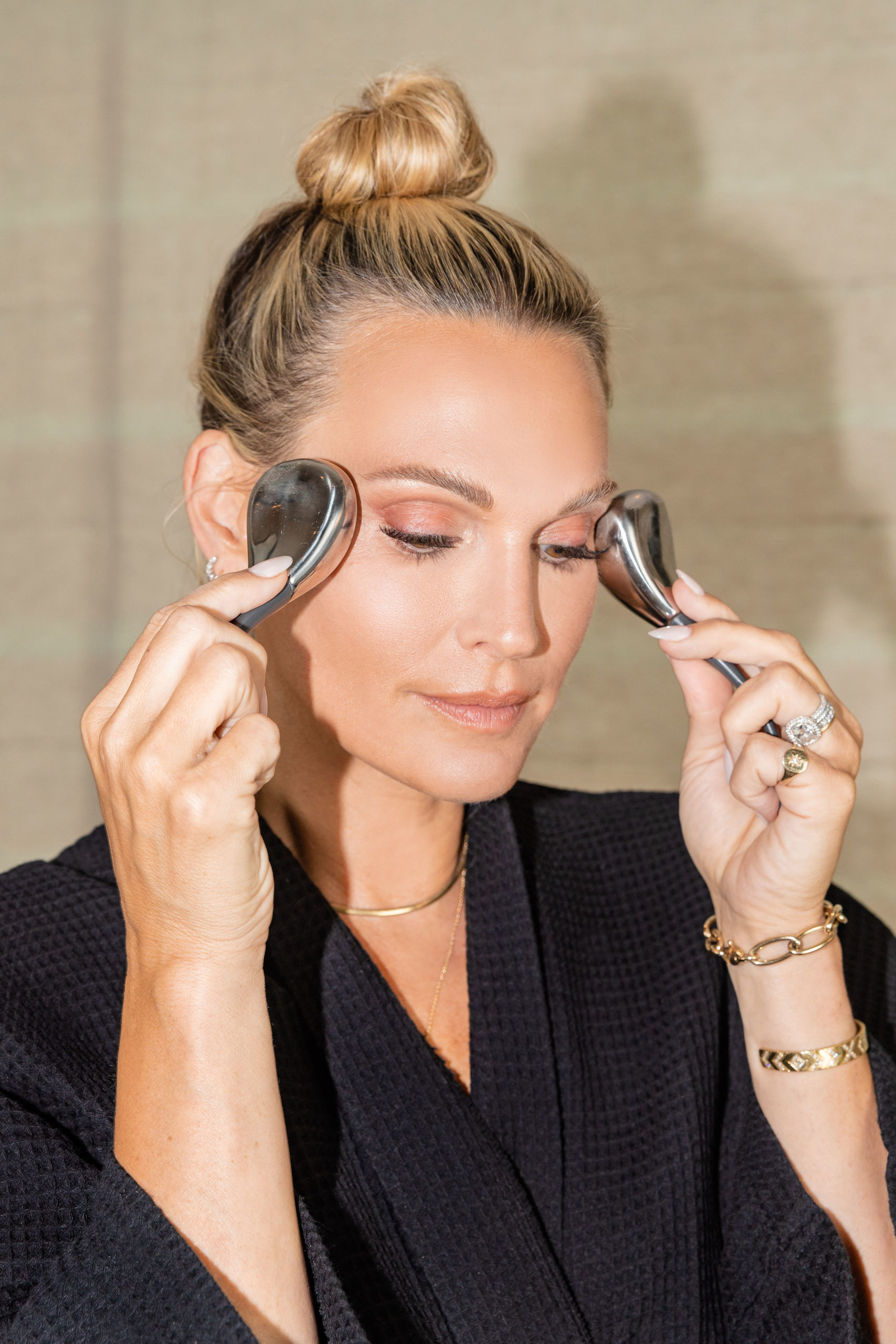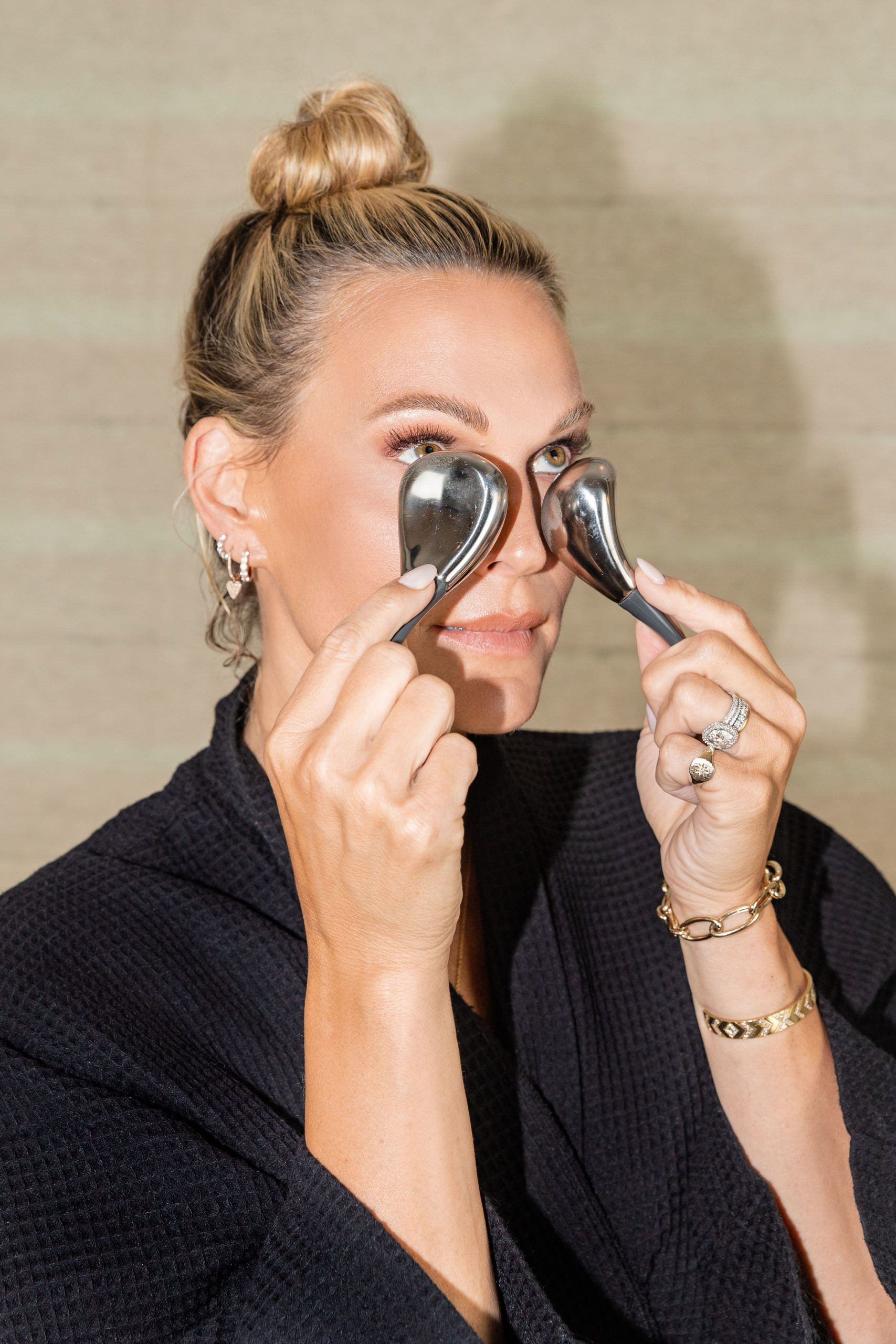Beauty...

By Elise Tabin
You don’t believe everything you hear, right? So why is it that beauty gossip swirls around certain skincare habits regardless of how hard we try to set the record straight? Take it from the experts—these are the biggest skincare myths, and we are debunking them once and for all.
Not everyone is dead set on incorporating a toner into their skincare routine—and that’s okay. But if you do use one, know that they aren’t detrimental to your skin. Nor will they leave your skin feeling tight, dry, or itchy. Certain types of toners, mainly old school alcohol-based ones—think the original SeaBreeze formulations—might have that effect, says celebrity facialist, Ildi Pekar.
Still, plenty of high-quality toners are available that don’t count alcohol as an ingredient.
If your favorite toner happens to contain alcohol, try swapping it for one with hydrating botanical ingredients like aloe or algae and natural humectants, including hyaluronic acid and glycerin. “Always apply toner right after cleansing to deliver the conditioning and hydrating benefits to the skin,” advises board-certified dermatologist, Dr. Howard Sobel.
Um, no. In a perfect world, we would all be able to decrease our pores for super smooth skin physically, but that’s not reality. The truth is, genetics determines pore size, and when they are full of dirt, oil, bacteria, and dead skin, the pores stretch out to accommodate the contents. On the flip side, when the pores are clean and free of contaminants, they don’t appear to be as enlarged.
A loss of collagen in the skin also gives way to stretched-out pores.
“However, you can make the pores look smaller by using retinol, which decreases dead skin cells inside the pores,” says board-certified dermatologist Dr. Debra Jaliman and the author of Skin Rules: Trade Secrets from a Top New York Dermatologist.
The best way to sustain smaller-looking pores is by keeping the skin hydrated with moisturizer and applying retinol and salicylic acid, which helps control the production and storage of sebum (a.k.a. oil). You can also ask your dermatologist about in-office treatments like professional facials and chemical peels to dislodge anything clogging the pores and collagen-stimulating treatments such as microneedling and fractionated lasers like Fraxel.
3.
No hard and fast rule says that anything natural, organic, or free from synthetic ingredients is better for your skin. “Many products can be organic and natural, but those classifications don’t make them better,” says Dr. Sobel. Case in point: allergy-instigating and sensitivity-promoting herbs, plants, flowers, and botanical extracts found in nature. Not everything that grows from Mother Earth offers therapeutic skin benefits either. Dr. Jaliman says if you have a skin sensitivity to an ingredient, you will still have the same sensitivity, whether natural or organic.
“For example, if you’re allergic to rose, you will be allergic to organic or natural rose as well.” It is essential to know that not all natural-derived skincare ingredients pose a threat to everyone, but some skin types can’t handle certain extracts, like lavender and jasmine, amongst others.
For skin types that are easily irritated or have known sensitives to certain natural ingredients, follow Dr. Sobel’s advice: look for minimal ingredient high-potency formulas that are clean, hypoallergenic, do not contain fragrance, and are phthalate-, paraben-, sulfate-, and emulsifier-free. And always purchase from reputable brands (like those from the list below), which are transparent about their products. And read the ingredient label, too.
This one couldn’t be further from the truth. All skin types, even oily skin, need hydration. In fact, not using moisturizer on oily skin can make it more oily, according to dermatological nurse and celebrity aesthetician Natalie Aguilar.
“When the skin is hydrated, it will produce less oil.”
Rather than using thick, occlusive creams, oily skin tends to fare better with gel-based moisturizers, lightweight formulations, and serums. Dr. Jaliman says non-comedogenic moisturizers are always the way to go for oilier skin types. She also shares that some people need a moisturizer on only some regions of the face, like under the eyes, where there are few oil glands. However, even if the skin is predominantly oily, chances are there are a few patchy areas where the skin may be a little drier, like “the sides of the face,” she says. So, you can spot-treat just those areas if applying moisturizer all over isn’t your thing.
You never want to store your products in direct sunlight, or a really hot space since both can deactivate the active ingredients in your products and render them pretty much ineffective. But that doesn’t mean you need to keep your beauty stash in a fridge of any kind. “Skincare products are not perishable like ice cream or milk, and most sustainability studies on products are conducted at room temperature,” says Dr. Jaliman. Plus, keeping your products at colder temperatures requires a bit of warming-up between the fingertips before application.
That’s not to say that there are no benefits to using something chilled–applying a cooling gel or serum to irritated and red skin helps to maximize the calming and soothing benefits and sensory feel on hot, itchy skin, says Dr. Sobel. However, refrigerated or not, products work at room temperature. “There are some formulas that are enhanced when refrigerated, but it doesn’t make it more effective,” explains Dr. Sobel.
If you like how cool-to-the-touch products feel on the skin, opt for gel formulations, rollers made of stones (they’re naturally colder) like jade, and steel-tipped applicators, which will make the application process more enjoyable and refreshing.

@cassidyblisscooper
Many people love a good toner, and others feel it’s a waste of time and money. But truth be told, it’s not obsolete, especially if your skin is acne-prone or oily. “Toner can be necessary for some skin types, like those with problematic skin who wear a lot of makeup on a day-to-day basis and need a toner to keep their skin balanced, toned, and disciplined,” says Aguilar.
Dr. Sobel calls toning “an important second step to cleansing that completes the process, yet many people choose to leave this step out.” Whether you choose to splash it on or spray it on your skin, toner helps to absorb excess oil on the surface. “It also removes any remaining bits of dirt and debris left behind by the cleanser.” Plus, for some skin types, the use of toner helps to calm and soothe the skin. “They also help nourish and hydrate the skin while restoring its delicate pH balance,” he adds.
We are setting the record straight on this myth and calling it BS. Dr. Jaliman says plenty of acid-based ingredients, like hyaluronic acid, will not burn or irritate the skin.
For the most part, acids, which belong to either the alpha-hydroxy acid family or the beta-hydroxy acid group, are safe to use on the skin and have a long-standing track record. Of course, abusing these ingredients, overapplying them, or overdoing them can render your skin red, flaky, irritated, and sensitive. But when used correctly, there’s no cause for concern.
Acids are perhaps the most reliable and effective way of successfully exfoliating the skin.
Take into consideration your skin type and pick the right ingredient and product so that there are no adverse reactions—and always follow the instructions to a T.
Good skincare that works, doesn’t burn or sting. Dr. Jaliman says that any burning sensation brought on by a skincare product means there is a sensitivity to the product, and you should discontinue using it.
While some ingredients and products may prompt a bit of a slight tingling feeling—think at-home chemical peels, acids, and retinoids—it’s usually not long-term and lasts only a few seconds at most. “Unless the product tells you it’s supposed to burn, that burning is a sign that the skin’s protective barrier is being compromised,” warns Aguilar. So non-exfoliating or non-acid-based products that sting or burn should be discontinued from your skincare routine and replaced with gentle alternatives.
The motto of ‘no pain, no gain’ doesn’t apply to skincare—this is one area where you don’t want your products to hurt, sting, burn, or create discomfort.